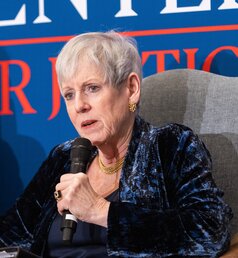
Former Ohio Chief Justice on Democracy, Gerrymandering, and Ukraine
In an interview, retired Ohio Chief Justice Maureen O’Connor spoke about her push for citizen-led redistricting in Ohio and recent trips to Ukraine advising on fair courts.
In February 2024, the Brennan Center for Justice, State Court Report, and the NYU Law Review hosted a symposium dedicated to state constitutional law. Several state supreme court justices who participated in the program sat down for brief interviews with State Court Report, which we are publishing as a series.
Maureen O’Connor joined the Ohio Supreme Court in 2002 and served as chief justice from 2011 through 2022. In her interview, she discussed the importance of citizens’ ability to amend Ohio’s constitution, expressed concern over gerrymandering, and talked about her work combatting corruption in Ukraine’s judiciary.

Is there anything particularly interesting that people might not know about Ohio’s constitution?
Our constitution was first ratified in 1851. It was revamped in 1912 in the Progressive era. That’s when it was amended to allow for citizens’ initiatives to amend the constitution and citizens’ right to have a referendum for statutes. Only 18 states in the country have that ability. We’re so fortunate in Ohio to have this constitutional initiative process.
I’ve looked at the historical notes from the 1912 convention. They considered women’s suffrage, and they said, “No, come on, we’re not going to give women the right to vote. Women are just so unpredictable.” And then someone said, “Can you imagine having a woman chief justice of the state supreme court?” Somebody showed this to me while I was chief justice. It was a hilarious conversation, just so sexist. But still, people should appreciate that the citizen initiative process came out of that convention. We are, in some ways, the beneficiaries of the Progressive era.
What are some memorable cases from your time on the Ohio Supreme Court?
In my last year on the supreme court, we had to decide whether maps for congressional and legislative races were valid. Those maps had been redrawn following the 2020 census by the Ohio Redistricting Commission. That body was created by a 2015 state constitutional amendment. It’s made up of partisan lawmakers and statewide elected officials, like the governor. Under the constitution, the maps they drew couldn’t be drawn primarily to favor one political party and they had to be proportional to how Ohioans vote, in terms of partisan breakdown.
The redistricting commission responsible for drawing them gave us seven maps — five state maps and two congressional maps. Their maps failed those tests. There are seven justices on the court. Four of us said that all of the maps presented were unconstitutional.
I wrote a concurring opinion on the first map we found unconstitutional, saying, “Hey, Ohioans, if you aren’t happy with the redistricting commission, you can change it with another constitutional amendment.” I wanted people to understand that they have the power to remove partisan politics from the drawing of the districts. To me, the constitutional amendment creating the partisan redistricting commission wasn’t living up to its promise. We could do better. There are other models for redistricting, like citizen-led, nonpartisan commissions staffed with ordinary people, not politicians with political and career interests wrapped up in the process. Think about it: politicians have an incentive to gerrymander. It helps them hold on to power.
Ohio has been one of the most gerrymandered states in the country for many years. Gerrymandering is profoundly undemocratic. It creates maps to set up elections so that the party drawing the maps will most likely win, no matter how the people vote.
There are four states that have citizen-led redistricting commissions: Michigan, Arizona, California, and Colorado. I described those in my concurrence. Sure, they may have their own issues, but they do quite effectively shield the redistricting process from manipulation by political actors.
Did Ohioans take you up on your suggestion to amend the constitution?
We’re working on it! I retired from the court in December 2022. And I decided to start working on redistricting reform immediately, in January 2023.
With so many partners — including the Brennan Center and many lawyers who volunteered their time — we drafted a proposed redistricting amendment that Ohioans will vote on in November. If it passes, it will completely change how we redistrict in Ohio. The new redistricting commission will not have any politicians on in it. It will have average citizens: five registered Democrats, five registered Republicans, and five people who belong to neither party. It’s fashioned after the citizen-led redistricting commissions in Michigan, Arizona, California, and Colorado.
The citizens will vote on it in November. I think it will pass overwhelmingly.
If it does, I’m hoping it will return to citizens a concept of fairness and trust. Because the voting public knows we have a gerrymandered legislature. There are a lot of people who don’t vote because they feel that their votes are worthless. In a gerrymandered environment, they are devalued. Those are the people that we’re hoping will get inspiration from this initiative.
That’s why I wanted the amendment to be called “Citizens Not Politicians.” We considered “Voters Not Politicians,” but I wanted it to have broader appeal — if you haven’t voted for years, here’s your opportunity. Get to the polls.
What else do you think people should be paying attention to in Ohio?
In August 2023, the legislature put a constitutional amendment on the ballot that would have required a citizens’ initiative to get 60 percent of the vote to pass, instead of 50 percent plus one. It was a blatant attempt to mess with reproductive rights and redistricting. Proposed amendments on those topics were coming down the pike, and the legislature wanted to make it harder for them to pass. It was an attempt to take something that has been guaranteed in the constitution since 1912 and an attempt to take away power from the voters. We should all be paying attention to assaults on direct democracy around the country.
The goofy thing about it is that when the legislature’s amendment to raise the initiative threshold was defeated in August, and then in November of that year Ohioans passed a constitutional amendment protecting reproductive rights, the folks in the legislature came out with statements like, “this this isn’t over yet.” What do you mean, this isn’t over? The people have spoken.
How else are you spending your time now that you’re retired?
I’m part of a six-person panel selected to vet the candidates for the Constitutional Court of Ukraine. Ukraine wants to be in the European Union, and the EU advised them of certain things they could improve upon, and one of them is their court system. There are lots of allegations of corruption in the court system.
I’m one of the international members on this advisory panel. There’s a gentleman from Slovenia, a woman from Poland, and three Ukrainians. The candidates for the constitutional court have filed their applications. I will be going to Ukraine at the end of this month for about two weeks to interview these candidates. We’ll make recommendations, and then the appointing authorities there will make the final decisions. This is all pretty exciting stuff. Provided Russia doesn’t conquer Ukraine. It’s tragic what’s Vladimir Putin is doing. [Ed. note: O’Connor made this trip as planned in February 2024. She has visited the country five times over the last year.]
Gabriella Sanchez is a staff writer and editor at the Brennan Center for Justice.
Suggested Citation: Gabriella Sanchez, Former Ohio Chief Justice O’Connor on Democracy, Gerrymandering, and Ukraine, Sᴛᴀᴛᴇ Cᴏᴜʀᴛ Rᴇᴘᴏʀᴛ (Oct. 15, 2024), https://statecourtreport.org/our-work/analysis-opinion/former-ohio-chief-justice-oconnor-democracy-gerrymandering-and-ukraine



Related Commentary
How Courts Oversee Ballot Initiatives
State courts — and to some degree federal courts — play a significant role in every stage of the direct democracy process.
Florida High Court to Hear Arguments in Politicized “Voter Fraud” Case
The case challenges Gov. Ron DeSantis’s prosecutions of people with felony convictions who thought they were eligible to vote.
State Court Oral Arguments to Watch for in February
Issues on the dockets include affirmative action, partisan gerrymandering, unaffordable bail, and juryless agency trials.
Voting Rights and Democracy in State Courts
Transcript of panel from Symposium: The Power of State Constitutional Rights